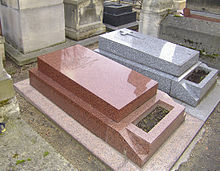Joseph Kosma
Joseph Kosma (born October 12, 1905 in Budapest , Austria-Hungary ; † August 7, 1969 in La Roche-Guyon , France ) was a Hungarian composer of Jewish origin who had lived in France since 1933. He drew attention there mainly with film music. His most famous piece is the song on the text Les feuilles mortes his friend, the poet Jacques Prevert , the first from the Diseuse Cora Vaucaire , later especially Juliette Greco and Yves Montand interpreted and, mostly with English text, an internationally-received jazz standard was ( Autumn Leaves ). Kosma also composed the music for operas, ballets (including for Roland Petit and Jean-Louis Barrault ), pantomimes (for Marcel Marceau ), stage pieces (for Jean-Paul Sartre , Georges Schehadé ) as well as vocal works, orchestral pieces and chamber music.
Life
He was born as József Kozma. He started playing the piano at the age of five and composed his first opera at the age of eleven. His teachers at the Budapest Music Academy included Leo Weiner and Béla Bartók . In 1928, thanks to a scholarship, he went to Berlin , where he met Eisler , Brecht and, last but not least, his future wife Lilli Apel. In 1933 the couple emigrated to Paris . With the German occupation of France, Kosma came under house arrest and a professional ban, but Prévert got him jobs in the film industry, for which colleagues made themselves available as front men. He escaped the imprisonment and deportation of foreign Jews from France. In 1944 Kosma got away with a bomb explosion.
Kosma died in 1969 in the Val-d'Oise department and was buried in the Montmartre cemetery in Paris.
Filmography (selection)
- 1935: The crime of Mr. Lange (Le crime de Monsieur Lange)
- 1936: A country party (Partie de campagne)
- 1937: The Great Illusion (La Grande Illusion)
- 1938: Beast Human (La Bête humaine)
- 1938: The Marseillaise (La Marseillaise)
- 1945: Children of Olympus (Les Enfants du paradis)
- 1946: Buccaneers of Love (Pétrus)
- 1946: Gates of the Night (Les portes de la nuit)
- 1947: SOS - 11 a.m. (La Dame d'onze heures)
- 1948: From person to person (D'homme à hommes)
- 1949: The port bar of Marseille (Hans le Marin)
- 1949–1951: Le Jugement de Dieu
- 1950: Steppe vengeance (Vendetta en Camargue)
- 1952: The Iron Glove (The Green Glove)
- 1956: Main Street (Calle Mayor)
- 1956: Dawn (Cela s'appelle l'aurore)
- 1956: White daisies (Elena et les Hommes)
- 1958: The black slave (Tamango)
- 1959: Katja, the uncrowned empress
- 1959: Breakfast in the countryside (Le Déjeuner sur l'herbe)
- 1960: The veil fell ...
- 1963: Chagall (documentary short film)
Compositions
- 1959: The Weavers of Lyon - Premiere ( Deutsche Staatsoper Berlin )
Web links
- Joseph Kosma in the Internet Movie Database (English)
- Works by and about Joseph Kosma in the catalog of the German National Library
Individual evidence
- ↑ here the version by Eric Clapton , 2010, accessed on December 12, 2011. The original version with Cora Vaucaire: https://www.youtube.com/watch?v=6_p4O10n7PE as well as the later most popular French interpretation by Yves Montand: https: //www.youtube.com/watch?v=kLlBOmDpn1s
- ↑ Brockhaus Encyclopedia in the 19th edition, Volume 12 from 1990
- ↑ Neue Zeit of June 23, 1959, p. 4
| personal data | |
|---|---|
| SURNAME | Kosma, Joseph |
| ALTERNATIVE NAMES | Mouqué, Georges (pseudonym); Kozma, József (maiden name) |
| BRIEF DESCRIPTION | Hungarian composer |
| DATE OF BIRTH | October 12, 1905 |
| PLACE OF BIRTH | Budapest |
| DATE OF DEATH | 7th August 1969 |
| Place of death | La Roche-Guyon , France |
